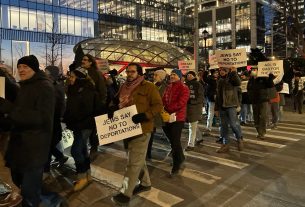((JEWISH REVIEW)) — A massive mural of a Jewish mother lighting Shabbat candles has just gone up in a Jewish neighborhood of Los Angeles, the first in a series of anti-hate murals planned across the city.
Painted by the Iranian-Jewish artist Cloe Hakakian, “The Common Thread” was painted on the exterior of an event venue in Pico-Robertson, a heavily Jewish neighborhood known for its abundance of synagogues and kosher restaurants representing a range of Jewish traditions. In February, two Jewish men in Pico-Robertson were shot on two separate days by an individual whom officials said had “a history of animus towards the Jewish community.”
Flames painted on the mural take the form of the Hebrew words “l’dor v’dor,” a term meaning “from generation to generation” that describes how Judaism is passed down over time. She said she had drawn upon the insights that community members had been invited to offer in planning workshops.
“I’ve done a lot of community murals, but this one was special because the community and each individual contributed to it. They shared their experiences and struggles of being Jewish. Public art has a huge role in social change and in revolutions, past and present,” Hakakian told The Los Angeles Daily News ahead of the mural’s unveiling.
“So a mural out in public, where people are driving by, will hopefully reach folks even outside of this community, and encourage them to talk and ask questions. That’s a powerful first step in fighting both antisemitism and all hate crimes,” she added. “And I hope it makes Jews feel seen and know they’re not alone.”
In addition to the shootings in Pico-Robertson, which took place just blocks from the mural’s location, several other high-profile incidents have put Los Angeles Jews on high alert in recent years. A city councilman representing the historically Jewish Fairfax neighborhood said he saw antisemitism in the damage that occurred there during racial justice protests in 2020. Last October, members of the hate group Goyim Defense League held up signs above a Los Angeles freeway that read “Kanye is right about the Jews,” a reference to antisemitic comments by the rapper Kanye West. The Anti-Defamation League’s audit of antisemitic incidents identified 237 in Los Angeles last year — an overall increase of 30% from 2021 — including 143 incidents of harassment.
“At a time when we see antisemitism and hateful messaging on the rise, it’s more important now than ever to highlight the experience and contributions of Jews and other marginalized communities in our city,” Jeffrey Abrams, the ADL’s Los Angeles regional director, said in a statement. “We know that exposure to other cultures and experiences can reduce bias and hate and that is exactly what we hope this mural will accomplish.”
“The Common Thread” is the first of a series of murals to be released throughout the city as part of the “L.A. vs. Hate: Summer of Solidarity” campaign, organized by the Los Angeles County Commission on Human Relations. Other projects will similarly use the arts and community events throughout the city to tackle hate crimes and address social and political issues, and more murals honoring Black and LGBTQ+ communities will be unveiled later this summer.
“We are proud to help lead this unifying collaboration, which heightens our sense of awareness of the uniqueness of communities across Los Angeles,” Joanna Mendelson, senior vice president of community engagement of the Jewish Federation of Greater Los Angeles, said in a statement. “The Summer of Solidarity initiative provides an opportunity to reflect the diversity of our Jewish community, and provides a moment to capture the cultural, historical, and spiritual influences that embody the Jewish Angeleno experience. We are prioritizing efforts to build bridges with our neighbors across Los Angeles, and recognize art, such as this mural, is a powerful vehicle to unite.”
In her statement, Hakakian also pointed out details from her mural that “celebrate the diversity of Jews within our community and the cultural experiences shared across time and place.”
In the folds of the woman’s headscarf, Hakakian says, “there is a young child held in the arms of her mother as older generations stand behind her, each figure wearing a pattern from the diverse cultural diasporas in Los Angeles county. Footprints move through the desert toward a bright horizon, a metaphor for migration, healing, and resilience within the Jewish community. Silhouettes of culturally significant Los Angeles county landmarks sit on the horizon, reminding the viewer of the greater community within which the Jewish community thrives.”




